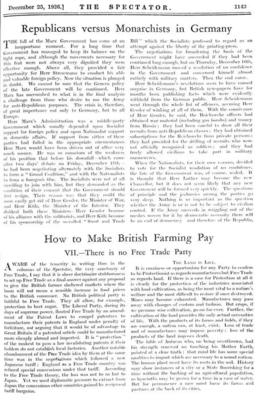Republicans versus Monarchists in Germany
THE fall of the Marx Government has come at an inopportune moment. For a long time that Government has managed to keep its balance on the tight rope, and although the movements necessary for this feat were not always very dignified they were effective enough. Above all, they provided a fair opportunity for Herr Stresemann to conduct his able and valuable -foreign policy. Now the situation is plunged in doubt. We cannot be sure that the Geneva policy of the late Government will be continued. Ikrr Marx has succumbed to what is in the final analysis a challenge from those who desire to use the Army for anti-Republican purposes. The crisis is, therefore, of great importance not only to Germany, but to all Europe.
Herr Marx's Administration was a middle-party Government which usually depended upon Socialist support for foreign policy and upon Nationalist support in domestic affairs. If support from either of these parties had failed in the appropriate circumstances Herr Marx would have been driven out of office very much sooner. He was so conscious of the weakness of his position that before his downfall—which came after two days' debate on Friday, December 17th -- he had been negotiating alternately with the Socialists to form a " Grand Coalition," and with the Nationalists to form a bourgeois Noe. The Socialists were not at all unwilling to join with him, but they demanded as the condition of their consent that the Government should first resign. Their reason was that they could the more easily get rid of Herr Gessler, the Minister of War, and Herr Kills, the Minister of the Interior. They disliked both these Ministers-- Herr Cessler because of his alliance with the militarists, and Herr Kills because of his sponsorship of the so-called " Smut and Trash Bill " which the Socialists professed to regard as an attempt against the liberty of the printing-press.
The negotiations for broadening the basis of the Government might have succeeded if they had been continued long enough, but on Thursday, December lath, Herr Seheidemann moved a resolution of no confidence in the Government and concerned himself almost entirely with military matters. Then the cud came.
Herr Scheidemann's revelations seem to have caused surprise in Germany, but British newspapers have for months been publishing facts which were evidently withheld from the German public. Herr Scheidemann went through the whole list of offences, accusing Ilerr Gessler of winking at all of them. With the connivance of Herr Gessler, he said, the Reichswehr officers had obtained war material (including gas bombs) and money from Russia ; they had been careful to draw all their recruits from anti-Republican classes ; they had obtained subscriptions for the Reichswehr from private persons ; they had provided for the drilling of recruits who were not officially recognized as soldiers ; and they had freely allowed civilians to take part in military manoeuvres.
When the Nationalists, for their own reasons, decided to vote for the Socialist resolution of no confidence, the fate of the Government was, or course. scaled. It is thought that Herr Luther may become the new Chancellor, but it does not seem likely that any new Government be formed very quickly. The questions of principle and the jealousies among the parties go very deep. Nothing is so important as the question whether the Army is or is not to be subject. to civilian control. if the Anny succeeds in wriggling out of the meshes woven for it by democratic necessity t here will be an end of democracy and therefor, of the Republic.


































 Previous page
Previous page